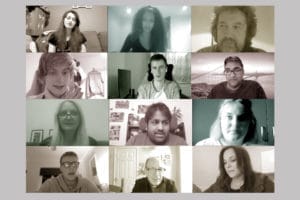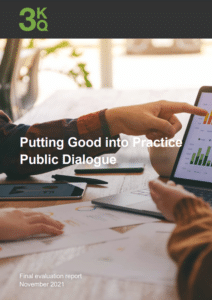Project Description
Project summary
In March 2020, the National Data Guardian and Understanding Patient Data commissioned a public dialogue supported by UKRI’s Sciencewise programme. The aim was to understand how participants assess public benefit in the use of health and adult social care data, for purposes beyond individual care. There would be two principal outputs. One is this public dialogue report – Putting good into practice: A public dialogue on making public benefit assessments when using health and social care data – published by the National Data Guardian on 14 April 2021. The second is guidance to support those making public benefit assessments, under the National Data Guardian’s statutory powers to issue guidance. This will draw on the dialogue findings and is due later this year.
The scope of the dialogue focussed on three key points. Firstly, to test the commissioning bodies’ existing understanding of what people consider to be beneficial about the use of health and adult social care data for purposes beyond individual care (e.g. research, innovation, planning). Secondly, to explore how people weight the benefits and risks of the use of data generated from publicly funded health and care. Thirdly, to explore how far the attitudes vary on the first two points when social care data is being used.
The dialogue took place during the COVID-19 crisis, and the ways in which the pandemic revealed or tested many aspects of health and social care undoubtedly informed participant thinking as they considered the use of health and adult social care data beyond individual care.
Participants were encouraged throughout the dialogue to imagine a time before the pandemic began affecting daily lives, and to consider a future where the major disruptive effects of COVID-19 are a memory rather than a current reality. This helped ensure that the findings go beyond a snapshot of people’s views during a crisis to provide a thoughtful response of long-term value.
The public dialogue engaged 112 participants recruited in a 50-mile radius from four locations: Great Yarmouth, Stockport, Plymouth and Reading. Each participant attended five dialogue events – 4 workshops plus a webinar. Dialogue activities were designed for online participation, with groups of 28 in each location supported to work collaboratively on Zoom. Reflective tasks were completed in participants’ own time in a dedicated online space. Throughout the process participants had the opportunity to interact and discuss the topic with policymakers and specialists in data use in health and adult social care settings.
The dialogue was conducted by Hopkins Van Mil and evaluated by 3KQ.

